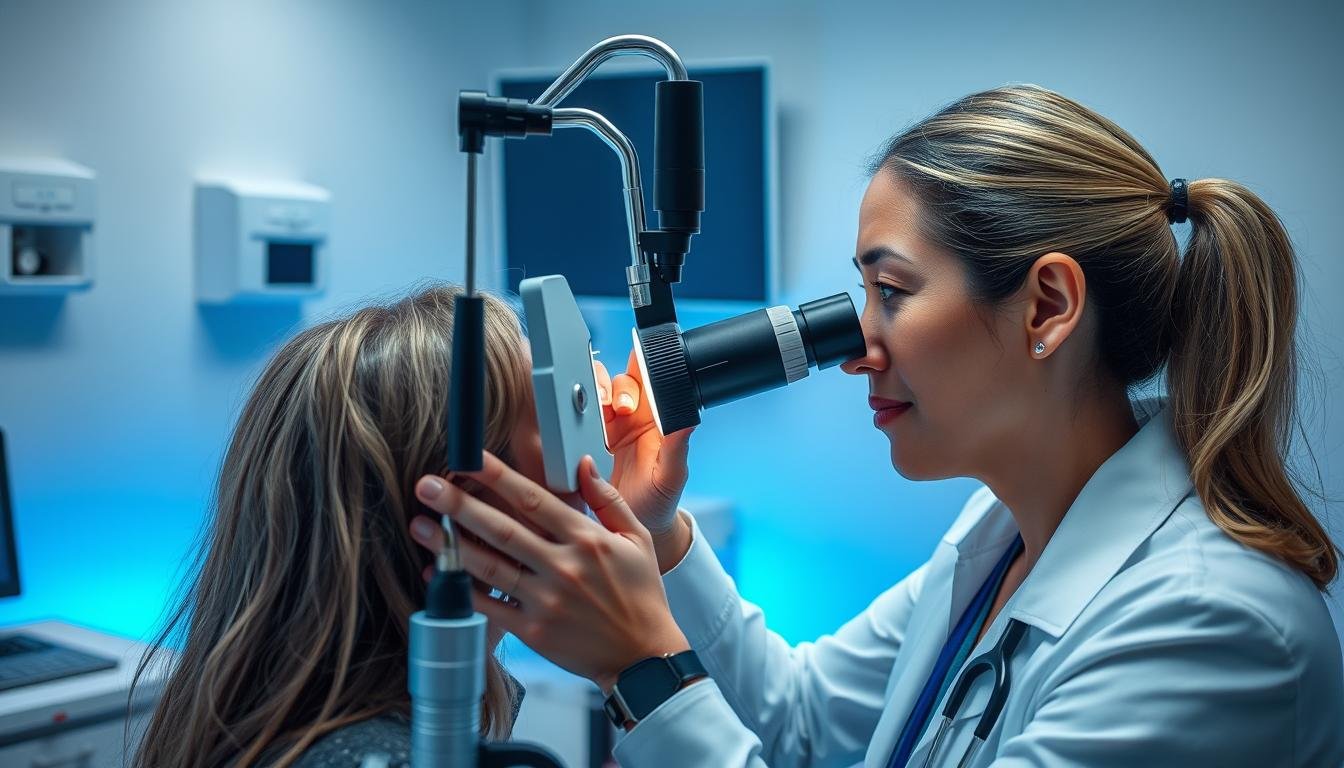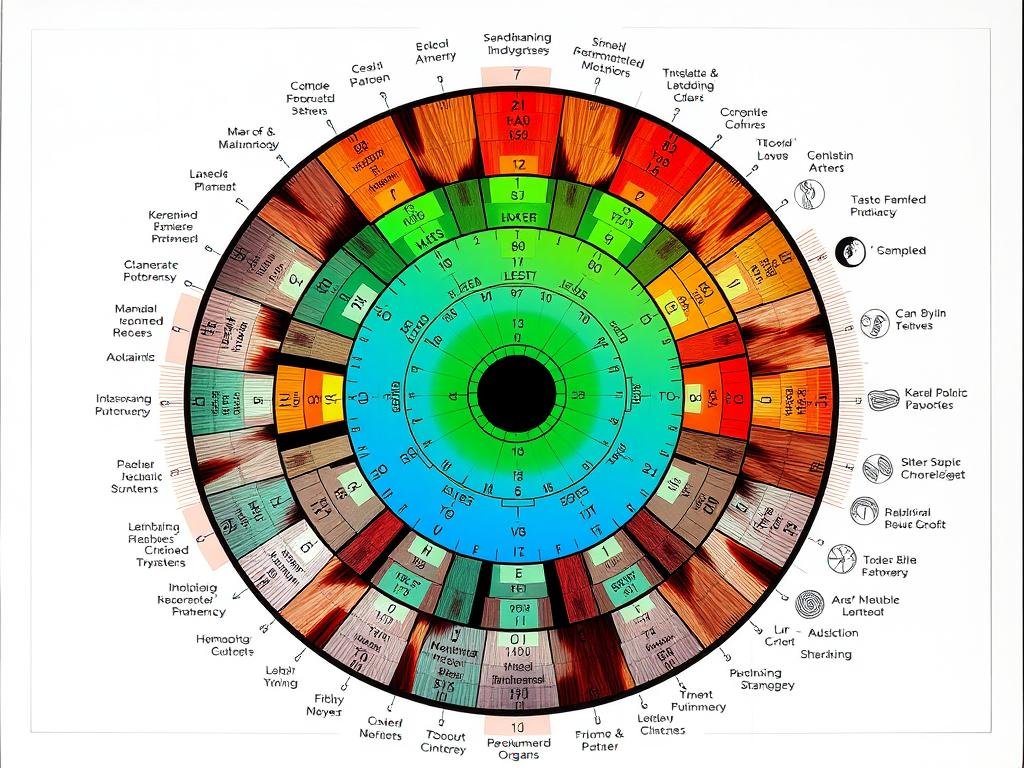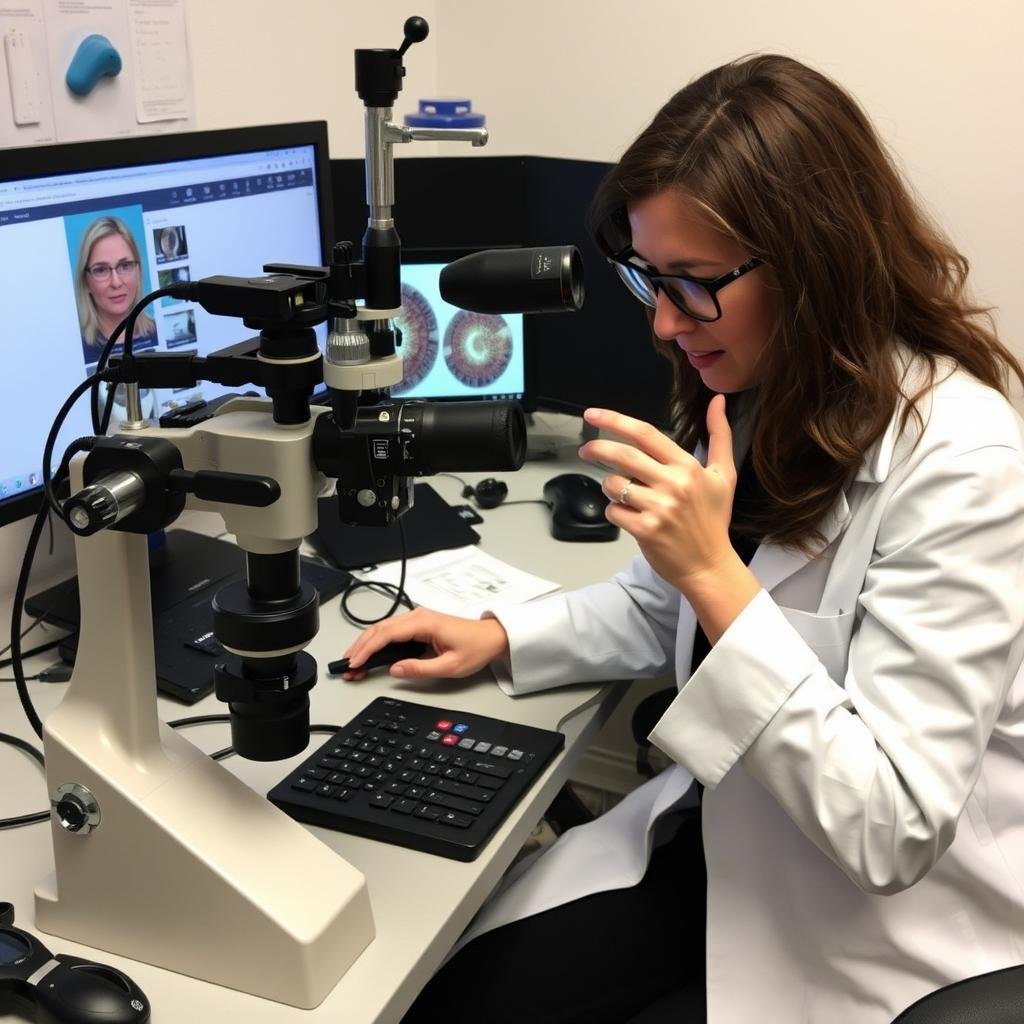Embarking on a journey to become a certified Iridologist opens doors to a fascinating career in alternative health assessment. Iridologists analyze patterns, colors, and other characteristics in the iris of the eye to evaluate a person’s overall health and identify potential health concerns. This comprehensive guide explores the training programs, certification requirements, and career opportunities available for aspiring Iridologists who wish to master the art and science of iris analysis.
A professional
Iridologist conducting an iris examination using specialized equipment
What Is an Iridologist?
An Iridologist is a practitioner who specializes in analyzing the iris of the eye to assess a person’s health status. The practice is based on the theory that each area of the iris corresponds to a specific part of the human body, and changes in these areas may reflect changes in the health of the corresponding body parts. Iridologists use detailed iris charts that map these correlations to guide their analysis.
The scope of practice for an Iridologist typically includes:
- Examining the iris using specialized equipment
- Identifying patterns, colors, and markings in the iris
- Correlating these observations with potential health issues
- Providing health assessments based on iris analysis
- Recommending lifestyle changes, dietary adjustments, or supplements
- Working alongside other healthcare practitioners in complementary roles
It’s important to note that Iridologists do not diagnose medical conditions or prescribe medications. Instead, they offer insights into potential health imbalances and areas that may benefit from attention or support.



Standard iridology chart used by Iridologists to map iris zones to body systems
Discover If Iridology Is Right For You
Download our free guide to learn more about the fascinating field of iridology and determine if becoming an Iridologist aligns with your career goals.
Download Free Career Guide
Iridologist Training Programs
Training to become an Iridologist involves comprehensive education in iris analysis techniques, anatomy, physiology, and holistic health principles. Programs vary in length, depth, and focus, with options ranging from short certificate courses to more extensive diploma programs.
Core Curriculum for Iridologist Certification
Most reputable Iridologist training programs include the following core subjects:
- History and principles of iridology
- Anatomy and physiology of the eye
- Detailed iris topography and mapping
- Iris signs, markings, and their interpretations
- Constitutional iris types and their significance
- Iris photography techniques
- Client assessment protocols
- Ethics and scope of practice
- Complementary holistic health modalities
- Business practices for Iridologists

Students in an Iridologist training program learning practical iris analysis techniques
Online vs. In-Person Iridologist Courses
Aspiring Iridologists can choose between various learning formats to suit their preferences and circumstances:
| Format | Advantages | Disadvantages | Best For |
| In-Person Courses | Hands-on practice, direct feedback, networking opportunities | Location-dependent, fixed schedules, typically higher cost | Visual learners, those who prefer structured learning environments |
| Online Self-Paced | Flexible scheduling, learn at own pace, often more affordable | Limited hands-on practice, requires self-discipline | Working professionals, parents, remote learners |
| Hybrid Programs | Combines online theory with in-person practical workshops | Requires some travel, scheduled intensives | Those seeking balance between flexibility and hands-on training |
| Mentorship Programs | Personalized guidance, real-world experience, networking | Limited availability, potentially higher cost | Serious practitioners seeking deep expertise and connections |
Accredited Iridologist Schools Worldwide
When selecting an Iridologist training program, it’s essential to choose one that is recognized by reputable iridology associations. Here are some well-established institutions offering iridology education:
North America
- International Iridology Practitioners Association (IIPA)
- Natural Health Institute
- Canadian Institute of Iridology
- Bernard Jensen International
Europe
- Guild of Naturopathic Iridologists (UK)
- European Institute of Iridology
- German Academy of Iridology
- Italian School of Iridology
Australia/Asia
- Australian Institute of Iridology
- International College of Iridology (Australia)
- Asian Institute of Iridology
- Natural Healing College (NZ)

International gathering of Iridologists sharing knowledge and techniques
Find Accredited Iridologist Training Programs
Discover the best iridology training programs in your area. Our database includes only accredited schools with proven track records of excellence.
Search Programs Near You
Iridologist Certification Requirements
Becoming a certified Iridologist involves meeting specific requirements established by professional iridology organizations. While requirements vary between certifying bodies, most follow similar standards to ensure practitioners have adequate knowledge and skills.
“Certification as an Iridologist demonstrates a commitment to professional standards and ethical practice in the field of iris analysis. It signifies that a practitioner has met established criteria for education, practical experience, and ongoing professional development.”
– International Iridology Practitioners Association

Newly certified Iridologists receiving their professional credentials
Clinical Hours for Iridologist Licensing
Most certification programs require students to complete a specified number of clinical practice hours to demonstrate proficiency in iris analysis. These requirements typically include:
| Certification Level | Required Clinical Hours | Supervision Requirements | Documentation Needed |
| Basic Certification | 50-100 hours | Partial supervision | Case studies, supervisor evaluations |
| Advanced Certification | 200-300 hours | Initial supervision, then independent | Detailed case studies, client feedback, analysis reports |
| Master Iridologist | 500+ hours | Minimal supervision | Comprehensive portfolio, research contribution |
Continuing Education for Iridologist Professionals
To maintain certification, Iridologists must typically complete continuing education requirements. These ensure practitioners stay current with advances in the field and continue to develop their skills.
- Annual continuing education requirements: 10-20 hours
- Attendance at professional conferences or workshops
- Participation in advanced training courses
- Subscription to professional journals and publications
- Membership in professional iridology associations
- Periodic recertification examinations (every 2-5 years)

Certified Iridologists participating in continuing education to maintain their credentials
Ready to Become a Certified Iridologist?
Take the first step toward your certification by applying for our comprehensive training program. Flexible payment options available.
Apply for Certification Training
Career Paths for Certified Iridologist Practitioners
A certification in iridology opens doors to various career opportunities in the alternative and complementary health field. Certified Iridologists can pursue several professional paths:
Private Practice Iridologist
Establish your own iridology practice, offering iris analysis and health consultations to clients. Many successful Iridologists build thriving practices by developing a reputation for accurate assessments and helpful guidance.
Integrative Health Iridologist
Work alongside other healthcare practitioners in integrative health clinics, providing iris analysis as part of a comprehensive approach to client wellness. This collaborative environment allows for holistic client care.
Educational Iridologist
Share your knowledge by teaching iridology to students, conducting workshops, or developing educational materials. Many experienced Iridologists find teaching to be a rewarding way to advance the field.
Research Iridologist
Contribute to the advancement of iridology through research, documentation, and publication. Research-oriented Iridologists help build the scientific foundation of the practice and develop new methodologies.
Product Development Iridologist
Apply your expertise to develop products related to iridology, such as specialized equipment, software, or educational materials. This entrepreneurial path allows Iridologists to shape the tools used in the profession.
Income Potential for Certified Iridologists
Income varies widely based on location, experience, and business model. Private practice Iridologists typically charge $75-200 per session, with experienced practitioners in major metropolitan areas commanding higher rates. Many supplement their income through product sales, workshops, or creating educational content.
FAQs About Becoming an Iridologist
How long does it take to become a certified Iridologist?
The time required to become a certified Iridologist varies depending on the program and your pace of study. Basic certification programs typically take 6-12 months to complete, while advanced certifications may require 1-2 years of study and clinical practice. Part-time students may take longer to complete their training.
Do Iridologists need a medical license to practice?
No, Iridologists do not typically need a medical license to practice, as they do not diagnose medical conditions or prescribe medications. However, regulations vary by country and region. In some areas, Iridologists may need to register as complementary health practitioners or obtain specific permits. Always check local regulations before establishing a practice.
What equipment does an Iridologist need to start a practice?
A basic Iridologist setup includes:
- High-quality iris camera or digital microscope
- Computer with iris analysis software
- Proper lighting equipment
- Iris charts and reference materials
- Client record-keeping system
- Comfortable examination chair
Startup costs typically range from $2,000-$10,000 depending on the quality of equipment chosen.
Can I practice as an Iridologist online?
Yes, many Iridologists offer virtual consultations. This requires clients to submit high-quality iris photos taken with proper lighting and equipment. While in-person examinations are generally preferred for optimal accuracy, virtual practice allows Iridologists to serve clients globally. Specialized software and clear guidelines for clients on how to capture usable iris images are essential for effective online practice.
Is there scientific evidence supporting the practice of Iridologists?
The scientific community has mixed views on iridology. While some studies have questioned its diagnostic reliability, many Iridologists report consistent success in identifying constitutional tendencies and areas of stress in the body. Research in the field continues to evolve, with some recent studies showing correlations between iris signs and certain health conditions. Reputable Iridologist training programs teach practitioners to work within the established scope of practice and to collaborate with medical professionals when appropriate.
Begin Your Journey as an Iridologist
Becoming a certified Iridologist offers a rewarding career path for those passionate about holistic health assessment. With proper training, certification, and dedication to ethical practice, Iridologists can make meaningful contributions to their clients’ wellness journeys. The field continues to evolve, with growing interest in integrating traditional iridology knowledge with modern health sciences.
Whether you’re drawn to private practice, education, research, or product development, the versatile skills you’ll gain as an Iridologist provide numerous opportunities to grow professionally while helping others understand their health through the fascinating window of the iris.
Ready to Start Your Iridologist Career?
Schedule a free consultation with one of our program advisors to discuss your career goals and find the right training path for you.
Schedule Free Consultation

 A professional Iridologist conducting an iris examination using specialized equipment
A professional Iridologist conducting an iris examination using specialized equipment










